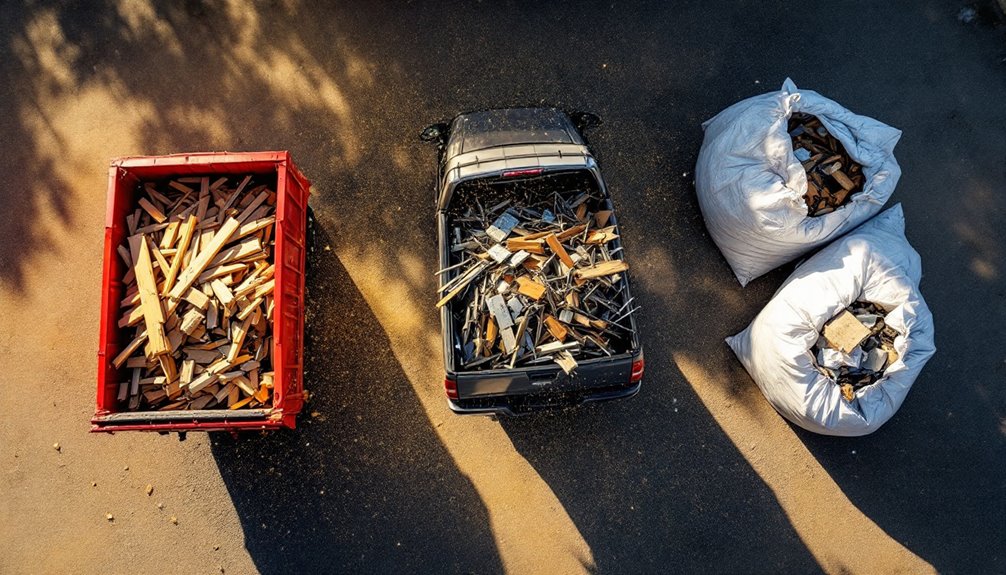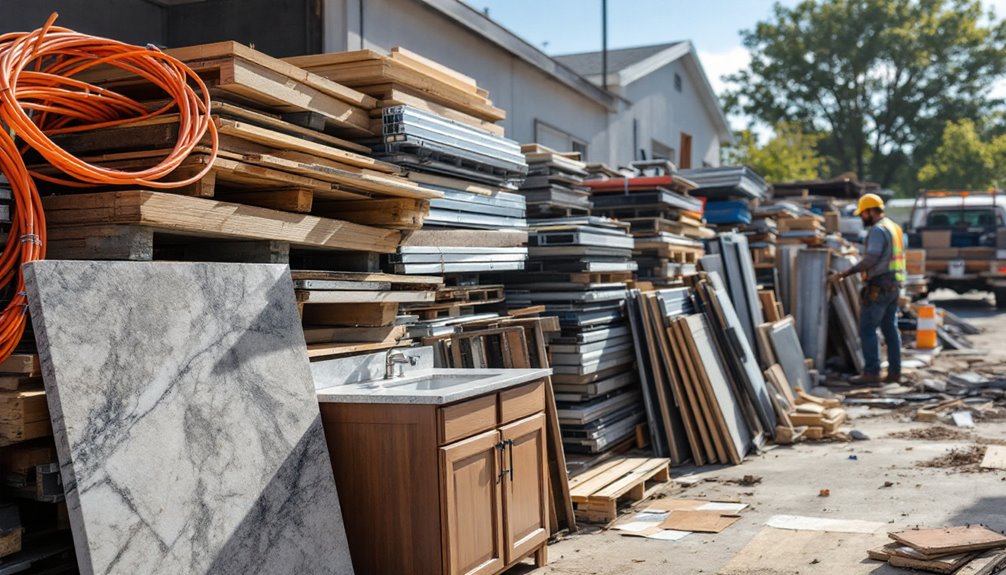You’ll save the most money by self-hauling your construction debris directly to a landfill or recycling center. While this method requires more physical effort and multiple trips, you won’t have to pay for dumpster rentals or professional removal services. You can even earn cashback by recycling materials like metals, concrete, and wood at specialized facilities. Exploring all your disposal options could reveal additional ways to reduce costs or even profit from your waste.
Key Takeaways
- Self-hauling debris directly to landfills or recycling centers is typically the most cost-effective disposal method, though it requires physical labor.
- Separate and sell valuable materials like metals, concrete, and wood to recycling facilities to offset disposal costs.
- Rent a dumpster for medium to large projects, as it offers better value than multiple self-haul trips.
- Choose a Bagster for small renovation projects under 3,300 pounds to save money compared to full dumpster rentals.
- Sort materials on-site and partner with local recycling facilities to reduce disposal fees and potentially earn rebates.
Understanding Your Construction Debris Disposal Options

When tackling a construction project, you’ll need to carefully evaluate your debris disposal options to minimize costs while maintaining efficiency. Your main choices include renting a construction dumpster, recycling materials, hiring a junk removal service, or using transfer stations.
Each option offers distinct advantages. Dumpster rental provides convenience with scheduled delivery and pickup, while recycling can help you meet local compliance requirements and support sustainability. Professional hauling companies can provide recurring pickup services that keep your site consistently clear of debris. For larger commercial projects, 40 cubic yard dumpsters are especially cost-effective for handling extensive demolitions and construction waste.
If you’re looking for a hands-off approach, junk removal services handle all the heavy lifting and cleanup. Transfer stations work well for smaller projects, letting you pay only for what you dispose of.
Self-Hauling: The Most Cost-Effective Method
Among all disposal options, self-hauling stands out as a budget-friendly choice for construction debris removal. You’ll have direct control over costs without paying service fees, and you can start immediately without scheduling appointments.
While self-hauling offers significant savings, you’ll need to weigh the trade-offs carefully. You’re looking at a physically demanding task that requires multiple trips and considerable time investment. If you’re not properly trained, you could face risks when handling hazardous materials or heavy debris.
Plus, without the right equipment, you might struggle with proper recycling and safe disposal methods.
Before choosing this option, guarantee you’re prepared with appropriate safety gear and knowledge of local disposal regulations. Remember, what you save in money, you’ll spend in time and effort.
Making Money Through Material Recycling and Resale

Did you know that your construction debris could be a hidden source of income? Instead of paying disposal fees, you’ll find opportunities to turn your waste into wealth through recycling and resale. Many materials have significant market value when properly sorted and processed.
| Material Type | Recycling Method | Potential Revenue |
|---|---|---|
| Metals | Scrap yards | Highest returns |
| Concrete/Asphalt | Crushing facilities | Transport cost savings |
| Wood | Chipping centers | Moderate returns |
| Porcelain/Tile | Manufacturer buyback | 40% material value |
You can maximize your profits by separating materials on-site and selling them to specialized recyclers. Don’t forget about tax benefits – donating reusable materials to charitable organizations can provide valuable write-offs. Plus, you’ll join a community of eco-conscious contractors who are making sustainability profitable.
Comparing Costs Across Different Disposal Methods
The key to minimizing your construction debris costs lies in choosing the right disposal method for your project. While self-hauling to a landfill or recycling center is typically the cheapest option, you’ll need to factor in vehicle wear, fuel costs, and your valuable time.
Dumpster rentals offer a cost-effective middle ground, especially for larger projects where you’ll generate waste over time. You won’t have to worry about multiple trips, though permit fees might apply in your area. For smaller projects, a Bagster can provide an affordable alternative to full-size dumpsters.
Professional junk removal services, while the most expensive choice, might save you money in the long run when you consider the time and effort they’ll save you, plus their focus on proper recycling practices.
Tips to Minimize Disposal Expenses
While selecting the right disposal method sets the foundation for cost savings, implementing smart waste management strategies can further reduce your expenses. Start by creating a detailed project plan that includes accurate measurements and inventory checks to avoid over-ordering materials. You’ll save considerably by training your crew to sort waste as it’s generated, separating recyclables like wood, metal, and concrete.
Consider partnering with local recycling facilities and donation centers for usable materials. This approach not only cuts disposal costs but also supports sustainability efforts. Choose materials with minimal packaging and opt for reusable shipping crates when possible. When you do need disposal services, look for companies offering upfront pricing and bulk discounts. Regular waste audits will help you identify additional opportunities to minimize expenses throughout your project.
Frequently Asked Questions
Can Construction Debris Be Used as Fill Material in My Yard?
You’ll need to test and classify your construction debris according to Part 360 regulations. Only clean, uncontaminated fill materials can safely be used in your yard after professional certification.
How Do I Dispose of Hazardous Materials Found During Demolition?
You’ll need to hire licensed hazardous waste contractors to safely remove and dispose of these materials. Don’t handle them yourself – they’ll be properly packaged, transported, and disposed of at authorized facilities.
Are There Seasonal Price Variations for Construction Debris Disposal Services?
You’ll find construction debris disposal costs peak during spring and summer when demand’s high. Save money by scheduling your project in the fall or winter when rates drop considerably.
What Tools Do I Need for Breaking Down Large Construction Debris?
You’ll need basic tools like sledgehammers and picks for smaller jobs, while larger projects require heavier equipment like excavators, jackhammers, and hydraulic claws to break down construction debris efficiently.
Do Municipalities Offer Special Construction Debris Collection Days?
You won’t typically find special construction debris collection days through your municipality. They’ll expect you to handle construction waste separately from regular residential services, often requiring private hauling arrangements.
Conclusion
You’ll find that self-hauling your construction debris is typically the most budget-friendly option, especially for smaller projects. If you’re willing to sort materials, recycling and reselling salvageable items can offset disposal costs or even turn a profit. Remember to get price quotes from multiple disposal services, rent the right-sized dumpster, and properly separate materials to maximize savings on your cleanup project.